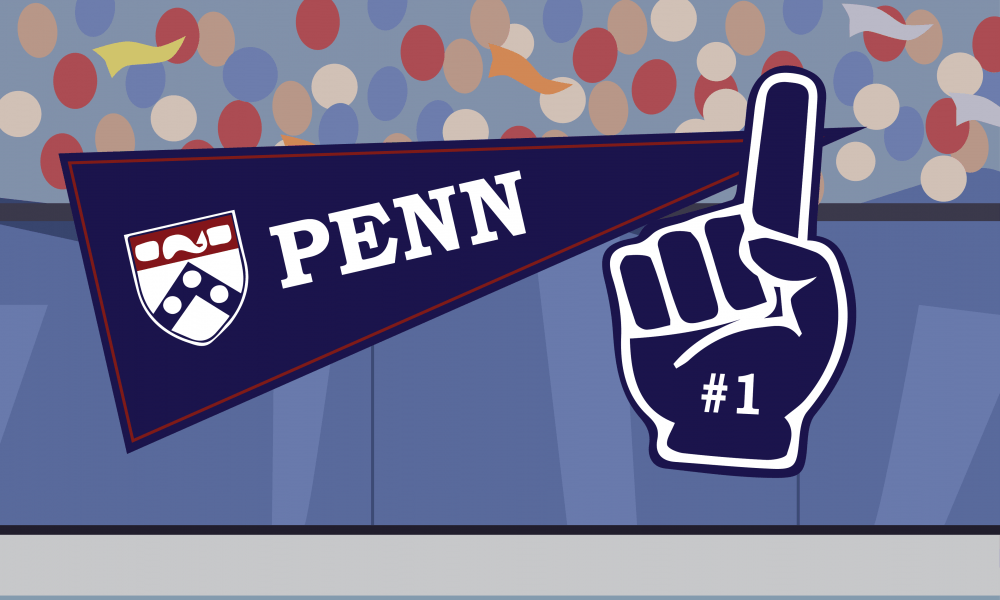
Mental health — a huge buzzword at Penn. There's a new DP article written on the matter nearly every week.
Penn has been under a firestorm of criticism for its inadequate investment in mental health services for both students and student athletes alike. The University has attempted to defuse the fire with efforts to improve CAPS and implement various “wellness initiatives.” Penn Athletics has responded with the decision to hire Dr. Andrea Wieland, a licensed psychologist with extensive experience in sports psychology, as the new associate athletic director for sports performance.
But what if improving sports culture at Penn became part of its mental health solution?
An improved sports culture constitutes more excitement around athletics from the Penn community. Students feel a greater sense of school pride. Tangibly, this would include higher sporting event attendance.
The University’s mental health issue is undeniably complicated. While the heightened attention on increasing mental health services is absolutely necessary, it overlooks a very fundamental cultural problem. It’s a well-known fact that feelings of loneliness present the biggest threat to the mental health of students here.
So then, how exactly would increasing attendance at university sporting events positively influence student mental health?
Sports have the amazing ability to foster a greater sense of community, irrespective of individual backgrounds. A sense of community has valuable implications for mental health.
Don’t believe me? Recall the victory parade when the Eagles won the Super Bowl last year. I’m not a die-hard football fan, but that was personally one of my best nights of my life and college experience. I felt an enormous sense of pride in being able to call Philadelphia home. You didn’t have to love the sport to feel excited; it was good enough to just absorb the energy of the crowd.
My personal experiences have shown me that having an unwavering support system is essential in reducing mental illness symptoms. It’s not about decreasing the number of stressors students face, but rather creating an environment that allows them to effectively cope. Generating a sense of community through sports would reduce the problem of mental health among the general student body.
Higher attendance at sporting events makes student athletes feel supported in their athletic endeavors. Non-student athletes benefit from feelings of school spirit. A good sports culture would spark further interest in the University’s academic programs.
This is a win-win-win scenario.
Why does Penn have a poor sports culture in the first place? It all goes back to Penn’s emphasis on academics. Prior academic commitments hold students back from attending games.
If a team is not likely to perform well, this is motivation not to go. Sporting events are free admission for all students, so affordability is not the issue. If students are not interested in sports to begin with, the lack of buildup before games is further disincentive to attend. Tailgating is prohibited at Penn, which causes students to believe that the game will not be fun.
This sports culture issue could be resolved by sending out more emails to the general undergraduate listserv and promoting sporting events as social events. Especially with home games, emphasizing the rivalries between Penn and other universities in the Ivy League is useful. Including the chance for free food and fan gear could incentivize attendance at athletic events. Allowing tailgates would hugely impact game attendance.
Ideally, this excitement would revolve around all Penn sports. Solely focusing on basketball and football would not fully indicate a cultural change.
Enhancement of sports culture strengthens school spirit and deepens the connection between athletics and the campus’ social sphere. Reigniting athletics as a place of school-wide social gathering is a feat that other extracurriculars on campus cannot accomplish without the risk of exclusion. At present, there is no better place suited to uniting the campus as a whole. Sporting venues are our best bet.
A holistic approach is undoubtedly necessary in improving mental health outcomes. The role of athletics in Penn’s mental health solution shouldn’t be understated.
NANCY HU is a College senior from Sarasota, Fla. and a former captain of Penn women’s swimming. Comments can be directed to dpsports@thedp.com.
The Daily Pennsylvanian is an independent, student-run newspaper. Please consider making a donation to support the coverage that shapes the University. Your generosity ensures a future of strong journalism at Penn.
Donate




